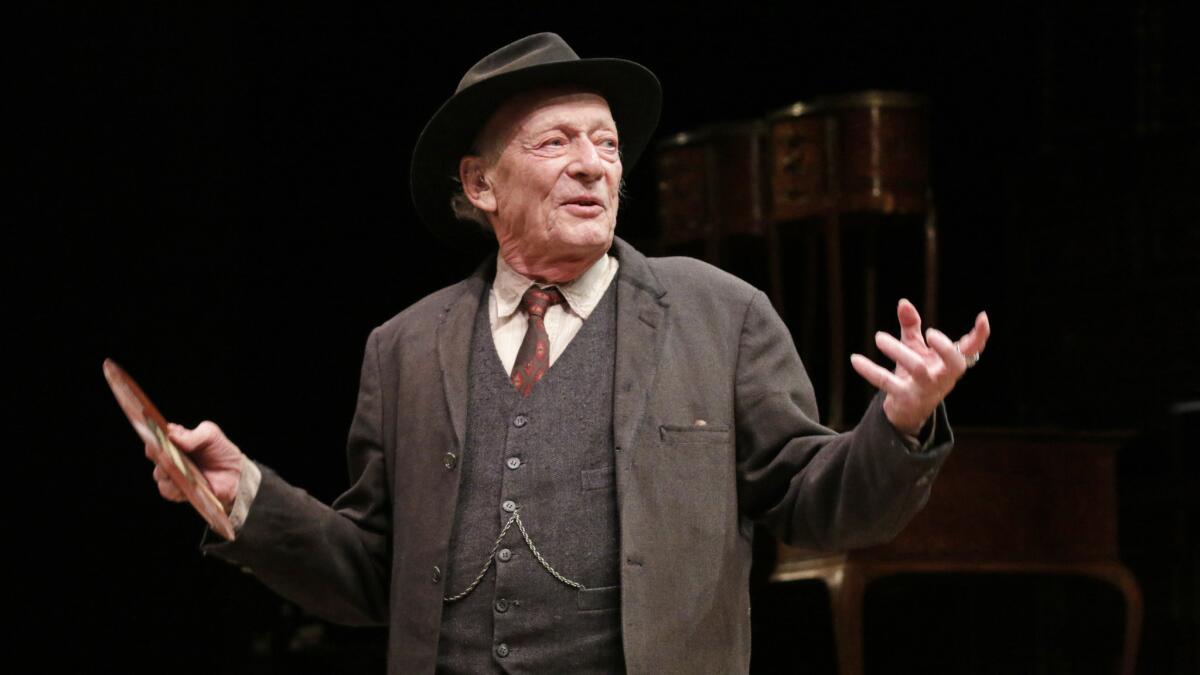Review: Arthur Miller’s ‘The Price’ bursts into meaning at Mark Taper Forum

Arthur Miller’s “The Price” is an old-fashioned play that takes a fair amount of time to get going, but when it does — midway through the second act — it explodes with the thunderous moral inquiry that has earned the author a place on the Mt. Rushmore of American playwriting.
Garry Hynes’ production, which opened Saturday at the Mark Taper Forum, is a shade too respectful. The Tony-winning Irish director treats the text as though it were a castle of poetry when it is a foursquare house made of prose.
Exposition could have been judiciously cut, repetitions eliminated and some delaying tactics sped up. (There’s a sleek 90-minute drama trapped inside this corpulent 2 1/2-hour domestic opera.)
Sign up to receive our Essential Arts & Culture Newsletter
But Hynes’ cast is first-rate. And when the characters are in pitched battle with one another, at last confronting their confounding and long-buried past, the production stops marking time and bursts into anguished meaning.
Set in the cavernous attic of a Manhattan brownstone that’s about to be torn down, the play deals with the remnants of an estate that have been locked away for years. Two estranged middle-age brothers — one a policeman who sacrificed a career in science to care for his father who was ruined in the 1929 stock-market crash, the other a prosperous surgeon who followed his ambitions and never looked back — must come to an agreement over the sale of these heirlooms.
Victor (Sam Robards) arrives on the scene in his uniform and mingles among the stately objects of his youth as though they were ghosts. There are armoires and bureaus and tables of the heaviest wood (Matt Saunders’ set resembles the warehouse of a pricey antique shop), but it’s the grand cracked harp and the old phonograph that draw Victor’s attention.
While waiting for his wife, Esther (Kate Burton), and the furniture appraiser, Gregory Solomon (Alan Mandell), Victor puts on a “laughing record,” a boyhood favorite that immediately cracks him up. But his own laughter is tinged with despair, the sound of a man swerving momentarily from grief at a funeral parlor.
Esther, who once wrote poetry and now seems to have developed a drinking problem, exhorts Victor to hold out for a good price on the furniture. She’s frustrated by her husband’s inability to rise in the world. She wants him to retire, ditch the blue uniform and get a job more in keeping with his original aspirations. As she sees it, the money from the sale of the furniture is Victor’s due — and final chance.
Solomon, the 89-year-old antiques dealer who has seen all kinds of family meshugas over inheritances, cautions Victor that “with used furniture you cannot be emotional.” But his advice won’t be easy to follow once Walter (John Bedford Lloyd) enters the picture wearing an expensive camel’s-hair coat and a look of determined charity.
A wealthy doctor, Walter doesn’t care about the money. But his every beneficent gesture will be interpreted by Victor as a bribe to keep the mistakes and failures of the past shrouded in silence.
The play builds to a standoff between the brothers, who contest each other’s version of family history. “The Price” isn’t always meticulous in its realism and the characters often speak to one another as though they were appearing before a jury, but there’s an enthralling uncertainty to the dramatic proceedings.
Miller’s play suggests that there’s something lacking in the perspective of both men, and the gripping nature of their argument stems not from the possibility of resolution but from the difficulty of assigning value to any one point of view.
Victor, who was blind to the manipulations of his father, has been stewing for years over the resentment he feels toward his brother. His anger has stymied him and he uses it as an excuse to do nothing. Walter, on the other hand, has conveniently negated the notion that there was anything worth being loyal to in their dysfunctional family home. Divorced and recovering from a breakdown, he seems to have nothing in his life but his love of medicine and his reputation for success. His wealth can only thinly disguise his emotional emptiness.
The appeal of the first half of the production comes largely from the portraits painted by Burton and Mandell. Their characters may be on the periphery of the fraternal battle, but the theatrical color they supply distracts us from the plodding pace of the writing and Hynes’ at times too deliberate staging.
Burton gives Esther’s frustration a ferocious bite. She lights a cigarette and threatens to go out for another drink like a woman who has lost faith in tomorrow. When she confronts her husband, her rage comes leaking out like water from a rusty kitchen pipe. Her love for her husband has become synonymous with indignation.
Mandell’s Solomon, his hands aflutter as though dancing on the keys of an adding machine, traverses the stage like an old bird on twig-like legs that are about to snap. Peeling a hard-boiled egg for emergency sustenance one minute, punctuating a philosophical thought with a Russian-Yiddish shrug the next, he offers much-needed comic relief to the audience — and in the process reminds us that Miller, for all his high moral seriousness, had a robust sense of humor.
There’s something initially too recessive about Robards’ performance — Esther’s impatience with Victor’s weak-willed nature seems entirely deserved. But his portrayal comes to life as soon as Lloyd’s Walter saunters into the attic with smarmy designs of understatedly playing the white knight.
Both these actors bring sharp clarity to the ambiguity of the brothers’ situation. Nothing is definitively settled — our sympathies are allowed to shuttle and it’s impossible to tell ultimately if a smile is truly heartfelt or smug —but the complexity of the picture is brought into focus. The last quarter of the play flashes by with astonishing velocity.
Miller wrote “The Price” in 1967 as the Vietnam War was surging. On stage, absurdist drama was all the rage. The playwright, no longer in fashion, had begun to feel, in his own words, “the absence — not only in the theater but everywhere — of any interest in what had surely given birth to Vietnam, namely, its roots in the past.”
His response was a play that dramatizes both the difficulty and necessity of untangling history. The canvas he chose was small but his vision, as always, is probing and penetrating.
More to Read
The biggest entertainment stories
Get our big stories about Hollywood, film, television, music, arts, culture and more right in your inbox as soon as they publish.
You may occasionally receive promotional content from the Los Angeles Times.







